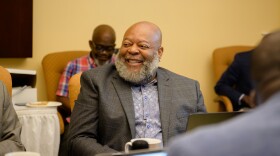ST. CROIX — The immediate departure of Pafford Medical Services from the Virgin Islands due to unpaid contract agreements after providing essential support to local first responders, nurses, and physicians since the devastation caused in 2017 by Hurricanes Irma and Maria is expected to leave a gap in health care that Government House indicated it will address.
The Arkansas-based company is in the process of demobilizing about 40 personnel, including paramedics, registered nurses, nurse practitioners, patient care technicians, and physicians to return to the U.S. mainland along with five ambulances it operated territory wide, according to Clay Hobbs, Pafford chief operating officer.
Hobbs, a paramedic who leads Pafford’s task force team that deploys nationwide, was stationed on St. Croix for 11 months immediately following Hurricanes Irma and Maria. He said his concern is with the territory’s dialysis and ambulance services.
“Those are two of the most critical health care areas that need addressed,” he said.
Hobbs said Pafford cannot continue to sustain operations in the territory without getting paid, regardless of how essential those services may be to residents and visitors. He said Pafford is owed a combined total of over $8 million from the Virgin Islands Department of Health, VI Fire and Emergency Medical Services, Governor Juan F. Luis Hospital and Medical Center, and Schneider Regional Medical Center.
Government House announced late Wednesday that the funding for Pafford’s services was supported by federal funds that have since been exhausted, adding that local funding is not able to sustain the elevated costs on a permanent basis.
Health care services are expected to be affected without Pafford’s presence in the territory.
“They don’t have the staff or the personnel within the territory,” Hobbs said. “That’s why we are providing those services. Those staff members do not exist within the territory, so we’ve been providing those personnel and equipment needs to sustain health care operations. I hope and pray that some type of agreement or arrangement’s been made to care for those patients.”

Hobbs said Pafford personnel provided home visits territory wide for about 90 vulnerable patients through a contract with the Virgin Islands Department of Health as a function of the DOH Mobile Integrated Health Care program. He said that program will discontinue.
“Everything will stop,” he said.
Richard Motta Jr., Government House spokesperson, said Pafford was an essential partner in the government’s effort to address a critical health care void in the territory. Now that Pafford will no longer be providing medical services, Motta said Government House will be gathering information to determine what that means to residents.
“There are some different facets to the services that they provided in the territory,” he said. “No doubt some will be impacted but which ones and the level of the impact is what we want to make sure that we are able to share clearly with the Virgin Islands community.”

Pafford had six personnel at JFL to include nurses and physicians, but their departure will not affect the hospital’s operations, Aniah John, JFL public information officer, said.
“Our team has been working on a succession plan, so we’re prepared,” she said, clarifying JFL has been making payments to Pafford.
Former Senator Kurt Vialet, who suggested renegotiation during a fiscal year 2022 budget hearing of Pafford’s federally-funded, $26.4 million contract with the DOH at the time, said today he was concerned how Pafford’s departure will affect dialysis and ambulance services. He pointed out Pafford personnel provided dialysis services on St. Croix and St. Thomas.
Hobbs said Pafford had about eight or nine nurses and dialysis technicians who provided services six days a week at Caribbean Kidney Center on St. Croix and St. Thomas. He said Pafford will continue providing dialysis services for the next couple days to aid the patients as they transition to alternative treatment. A message left for Dr. Walter Gardiner, CKC medical director and owner, was not returned as of the time of publication.
Vialet further noted the impact Pafford’s departure will have on ambulance services, questioning how the ambulance response time will be affected.
“I would want to know how they’re going to be able to supplement that ambulance service, so we don’t have a long period of time in which individuals are able to receive assistance because of the reduction in ambulances,” he said. “I’m hoping that they have trained up some of the Fire Service staff and that they will be able to fill into those positions, but I know that we’re going to be actually losing some of the actual hardware. They’re making plans to send the ambulances back to the mainland, so we need to do a paper analysis.”

Hobbs said Pafford will be leaving the Virgin Islands with five of the company’s ambulances that operated territory wide. Antonio Stevens, Fire and Emergency Medical Services director, deferred comment to Government House when asked how his EMS operations would be affected without Pafford’s services.
Motta said Pafford will be considered for future contracts as needed, based on the availability of funds and the requirements of the community. Hobbs said Pafford would consider entering into a contract with the government in the future, stressing that Pafford’s presence in the territory goes beyond a financial responsibility.
“It’s really taking care of people, and that’s what we do at Pafford Medical Services,” he said. “We’re a 57-year-old, family-owned health care company that cares for our communities. So, if there’s a way that we can continue to provide that service in the Virgin Islands under contract, we definitely will work with the Virgin Islands government.”
While Pafford is open to contracting its services with the government, Government House indicated in its statement that the government and the agencies that utilized Pafford’s services have established comprehensive contingency plans and/or separate contractual agreements with Pafford to ensure the continuity of emergency medical services and prevent any disruption in services during this transitional period.
Hobbs, while speaking on deployment in Florida to provide emergency response in the aftermath of Hurricane Debby, said he was not aware of any contingency plans.
“At this point we have no agreement in place,” he said. “We’re still waiting for any further development from Government House, and we look forward to working with them, and we will do anything that we can to sustain operations and continue to have staff within the territory.”
Hobbs clarified that he was deployed in Florida, suggesting it was possible that Government House reached out to someone else at Pafford. He stressed that Pafford remains concerned.
“It’s not just an assignment to us to be located in the Virgin Islands,” he said. “It’s really a mission that we take very seriously. We know the residents. We know the patients of the Virgin Islands. We’ve been caring for them for seven years, and many are like family to us.”















